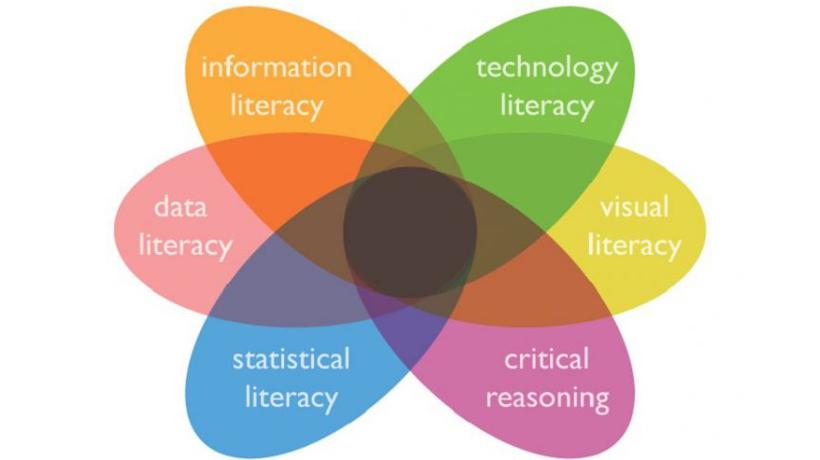Why Students Must Learn Cloud Basics
In the digital landscape, the way we use technology has undergone significant changes. It is no longer about knowing how to open a document or simply browse the internet. Nowadays, it's more about understanding how everything connects and operates in the cloud. Can you imagine being able to store, access, and manage huge amounts of data from anywhere and anytime?
Now, picture yourself creating online tools that require no physical computer hardware. This is no longer a product of the future, in fact, this is what cloud computing looks like today. However, cloud computing for students isn't just a bonus skill for 2025 and beyond, it is becoming as important as knowing how to read and write. Exploring practical cloud computing courses online, you can turn this complex subject into something easy to understand, hands-on, and exciting, setting you up for a great cloud computing career ahead.
The Evolution Of Literacy: From Books To Bytes To The Cloud
For decades, digital literacy has been quite the buzz in education, emphasizing the ability to find, evaluate, create, and communicate information using digital technologies. It is more about navigating the internet, using the office software, and understanding the fundamentals about online safety.
With continuous evolution, the meaning of digital literacy has changed in the twenty-first century. Let's be honest, we are no longer just consuming digital content, we are interacting with vast, interconnected systems that reside in the cloud. From streaming our favorite shows to collaborating on documents, from using AI-powered tools for homework to accessing open educational resources (OERs), the underlying infrastructure is almost always cloud computing. However, this pervasive presence makes cloud computing for students not just an advantage, but a fundamental skillset: the latest digital literacy.
Why Is Cloud Literacy For Students So Important Now?
The world is running on the cloud, whether it's businesses or governments. Even everyday applications that are increasingly reliant on the cloud infrastructure. Remember, this isn't just a trend, it is the foundation of modern-day technology. Here's why the importance of cloud literacy for students cannot be overstated:
Ubiquitous Technology
If you are a student who uses Google Docs for group projects, submits assignments through Learning Management Systems, or collaborates on code with your peers, you are interacting with cloud-based services. However, understanding the fundamentals of how these systems work, rather than just how to click buttons, empowers the students.
Future-Proof Careers
The job market of 2025 and beyond will be dominated by the cloud-fluent professionals. According to recent reports, cloud computing skills are consistently among the most in-demand globally. By the year 2027, the employment rate for roles requiring cloud expertise is expected to see a significant increase, potentially boosting millions of jobs worldwide. Therefore, students equipped with cloud skills will have a distinct competitive advantage.
Powering AI And Emerging Tech
Artificial Intelligence (AI) and Machine Learning are not just buzzwords; they are transformative technologies deeply intertwined with the cloud infrastructure. Training AI models and deploying AI-powered applications require immense computational power and storage, which the cloud provides. For all the students interested in AI, understanding cloud computing is a first step towards building and deploying intelligent systems.
Enhancing Open Educational Resources
The future of education is moving towards accessible, collaborative, and adaptable learning materials. However, OERs, freely available educational content, are heavily reliant on cloud platforms for storage, distribution, and collaborative development. Students with access to cloud literacy can simply leverage the resources more effectively, and also contribute to their creation and improvement, fostering a truly open learning ecosystem.
Cultivating Digital Citizenship
Go beyond your technical skills, Cloud literacy in education fosters a deeper level of understanding of data privacy, security, and ethical considerations in a cloud-first world. All students learn about data protection, encryption, and responsible digital practices, making them more informed and secure digital citizens.
What Does Cloud Literacy Look Like For Students?
Cloud literacy for students is not about becoming a certified cloud architect overnight. It is about grasping foundational concepts that demystify the magic within the cloud. Here's what it includes:
Understanding Cloud Services Models
Understanding the difference between using software as a Service (SaaS), building on a platform (PaaS), or managing virtual infrastructure assists the students in opting for the right type of tools for their projects.
Recognizing Deployment Models
Understanding and analyzing where your data lives and who controls it is important for security and privacy awareness.
Grasping Virtualization
Learning how a single physical server can host multiple virtual ones is the key to comprehending cloud efficiency.
Basic Cloud Security Concepts
Understanding about the data protection, authentication, and the shared responsibility model.
Awareness Of Cloud Benefits
Recognizing how the cloud enables scalability, collaboration, and cost effectiveness.
Cloud Computing Courses And Certifications: Shaping The Future For Students
Acquiring the crucial cloud skills for students is more accessible than ever before. However, there are comprehensive cloud computing courses specifically designed to break down complex topics into manageable and engaging modules. Remember, it is not just dry lectures, as they often incorporate:
- Easy-to-follow visuals
Making abstract concepts manageable and understandable. - Practice tests
To reinforce learning and help students build confidence. - Hands-on lab activities
Important for practical understanding and skill development.
Whenever you enroll in a quality cloud computing course online, you are not just learning theory, but also gaining profound, practical skills that will directly shape your future. These courses will help you get introduced to the essential concepts such as:
Cloud Fundamentals
Grasping core concepts such as the deployment models, whether public, private, hybrid, or the service models (SaaS, PaaS, IaaS).
Virtualization Mastery
Learn how virtualization powers the cloud and explore different types of hardware and storage servers.
Cloud Security And Storage
Implementing data protection, encryption, and security best practices for cloud environments.
Scalability And Redundancy
Designing scalable cloud solutions and ensuring high availability with redundancy strategies.
Cloud Management And Operations
Administering cloud resources, optimizing costs, and tackling real-world cloud challenges.
Mobile Cloud Computing
Explore how cloud integrates with mobile tech for seamless integration and on-the-go access.
The Future Of Education And Cloud Literacy
As we are transitioning into 2025, the entire synergy between cloud literacy in education, AI, and open educational resources will become increasingly pronounced. Cloud platforms offer a scalable infrastructure for AI development and AI can help customize and enhance the OERs, making them more adaptive and effective for the individual learners. For all the students, this means unparalleled opportunities to:
- Access diverse learning content.
From interactive simulations to vast digital libraries, all powered by the cloud. - Collaborate globally.
Working with peers and educators across the continents on cloud-based platforms. - Innovation and creation.
Opt for cloud resources to develop applications, AI projects, or even the latest educational content. - Become job-ready.
Get ready for a workforce that demands cloud-savvy individuals.
Concluding Thoughts
Understanding cloud computing is rapidly becoming a nonnegotiable skill. That is why equipping students is no longer about teaching them just about technology; it is more about preparing them for a world built on the cloud. Are you ready to take your digital proficiency to the next level and say hello to the future full of endless possibilities?









